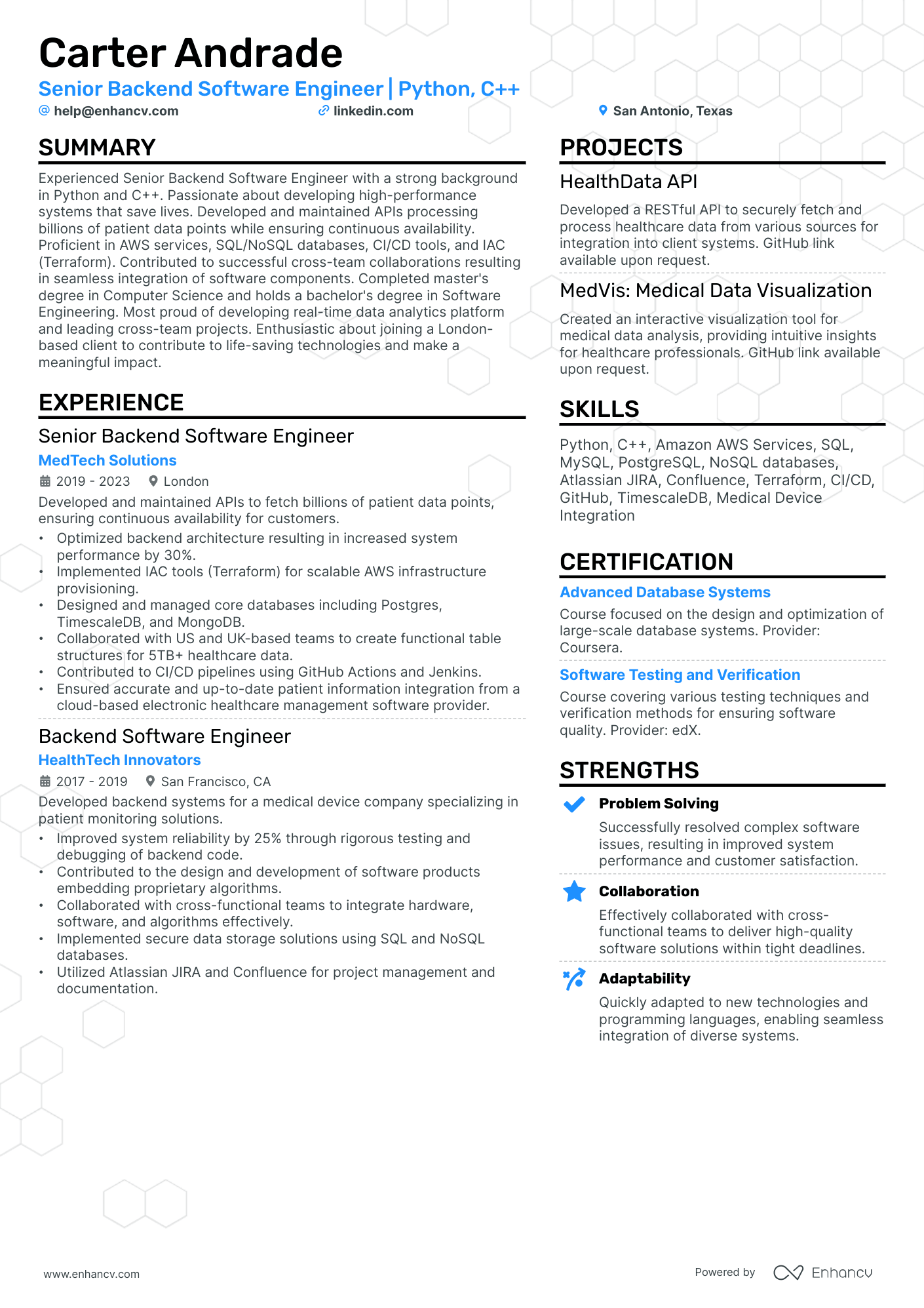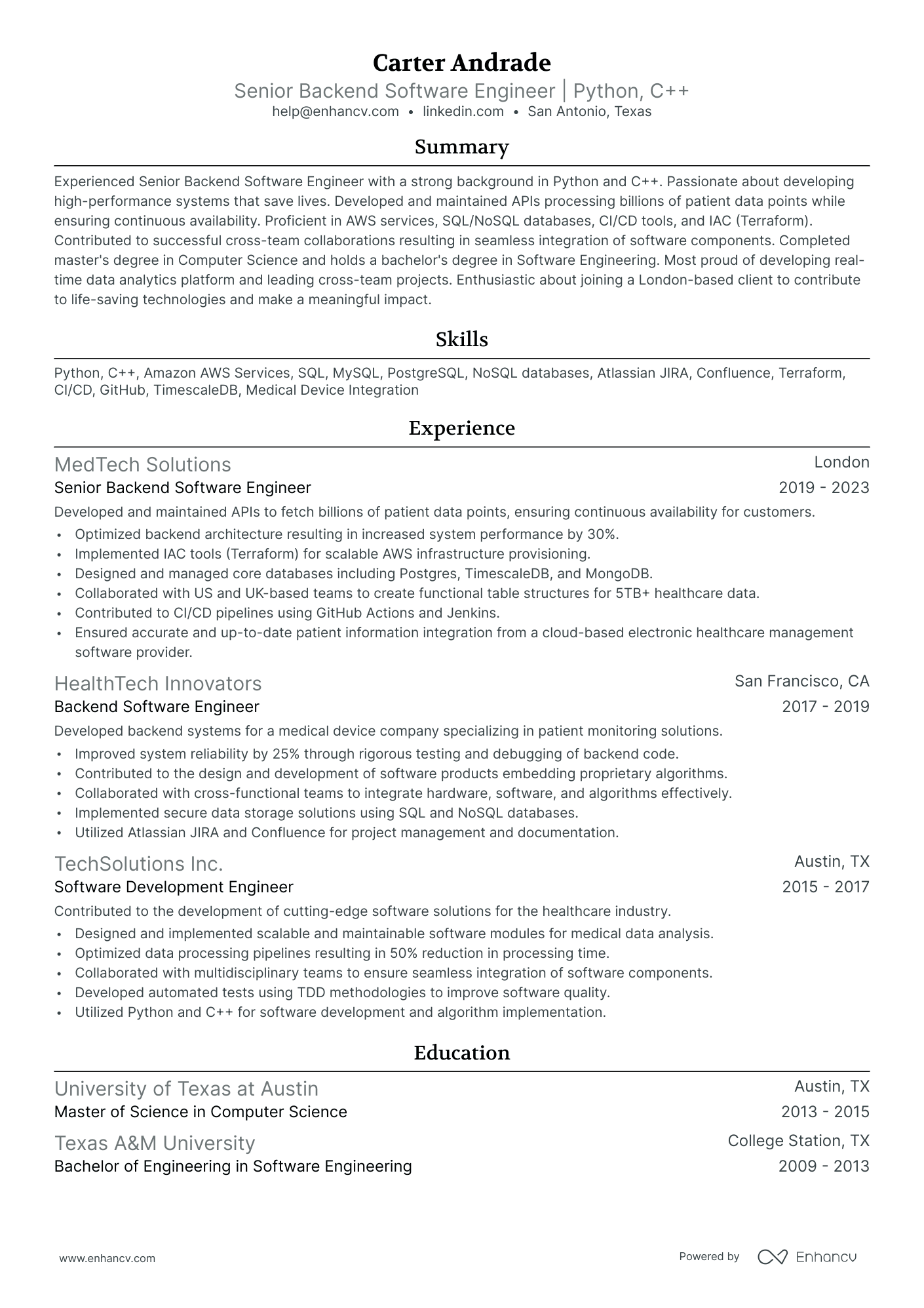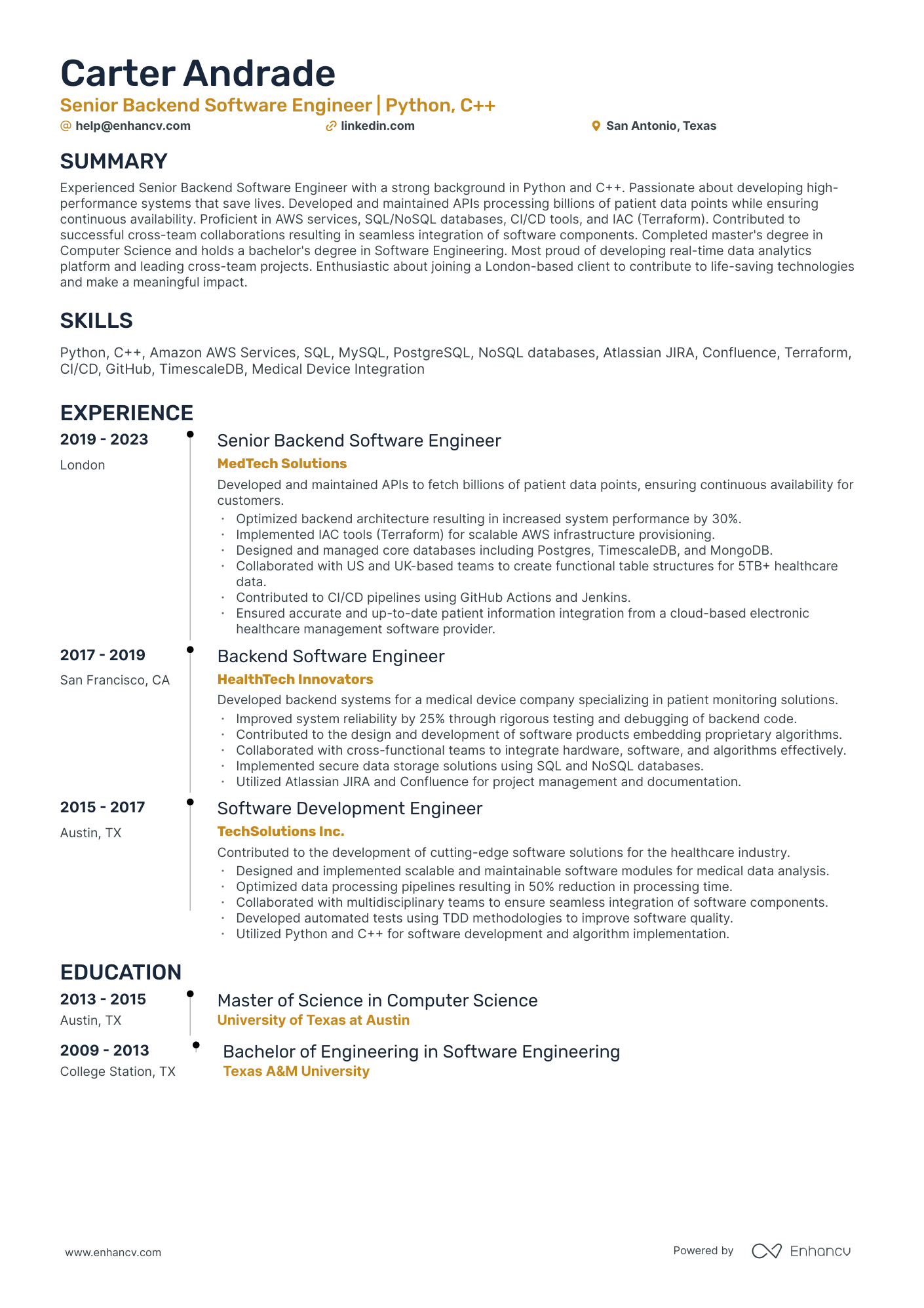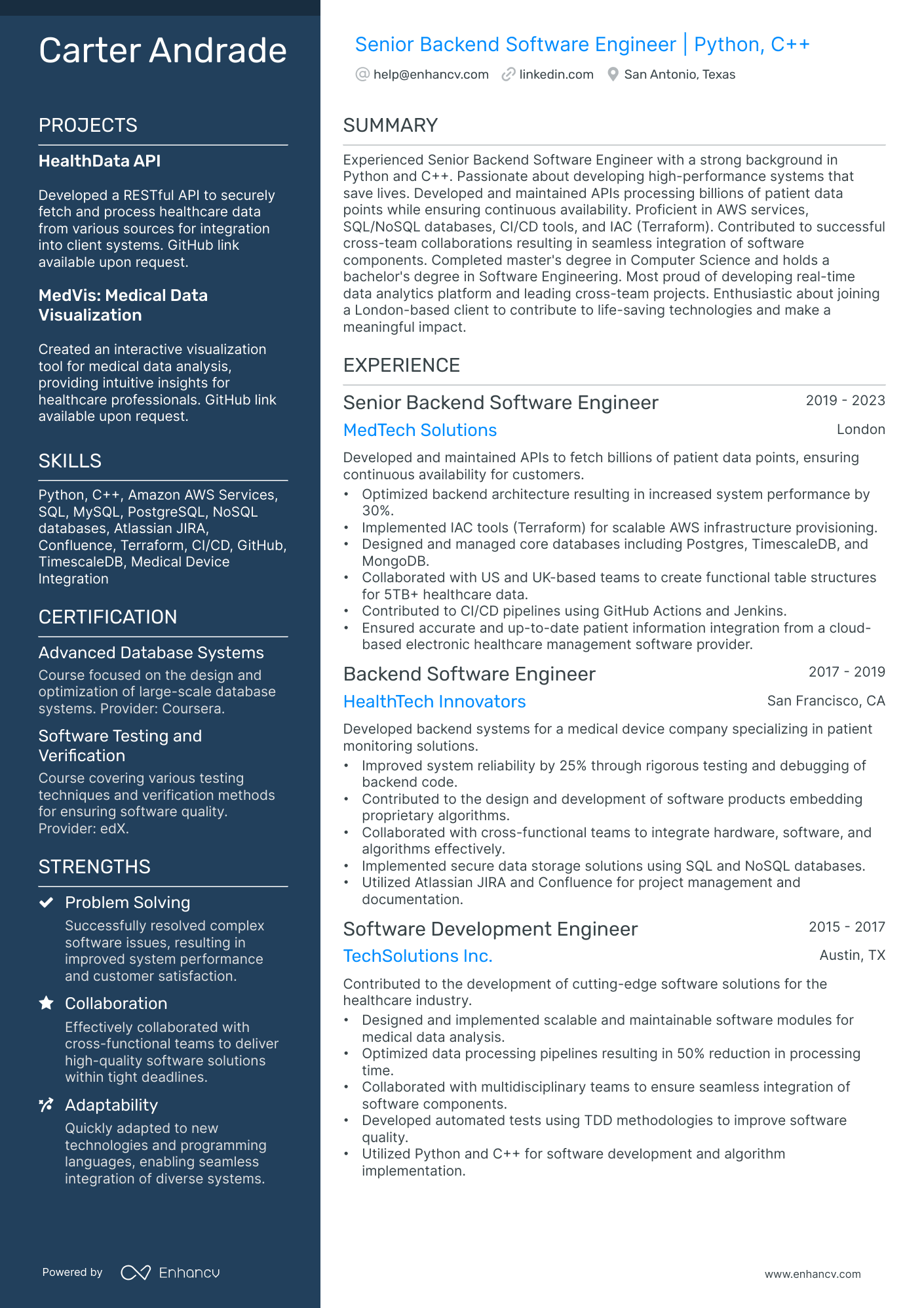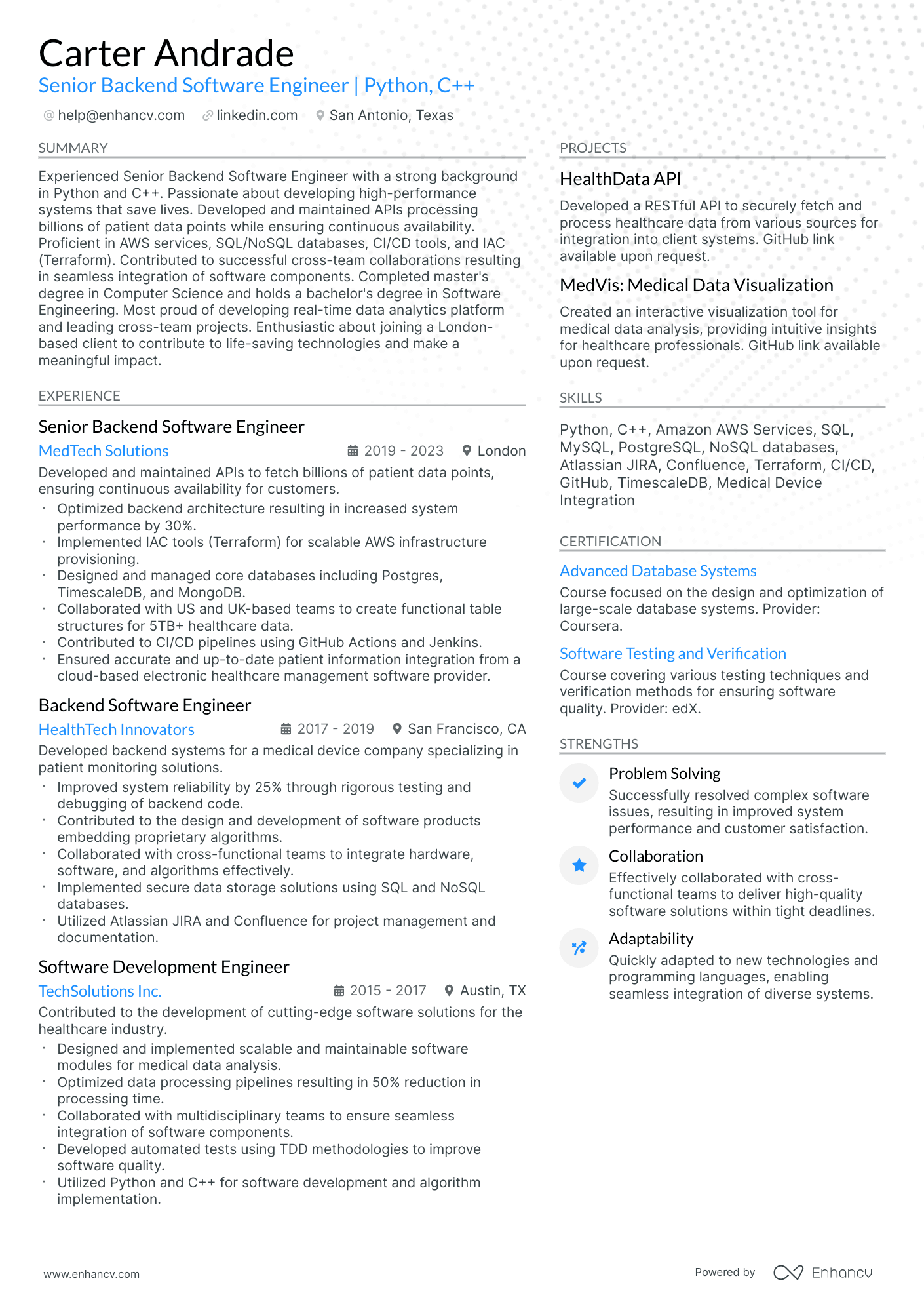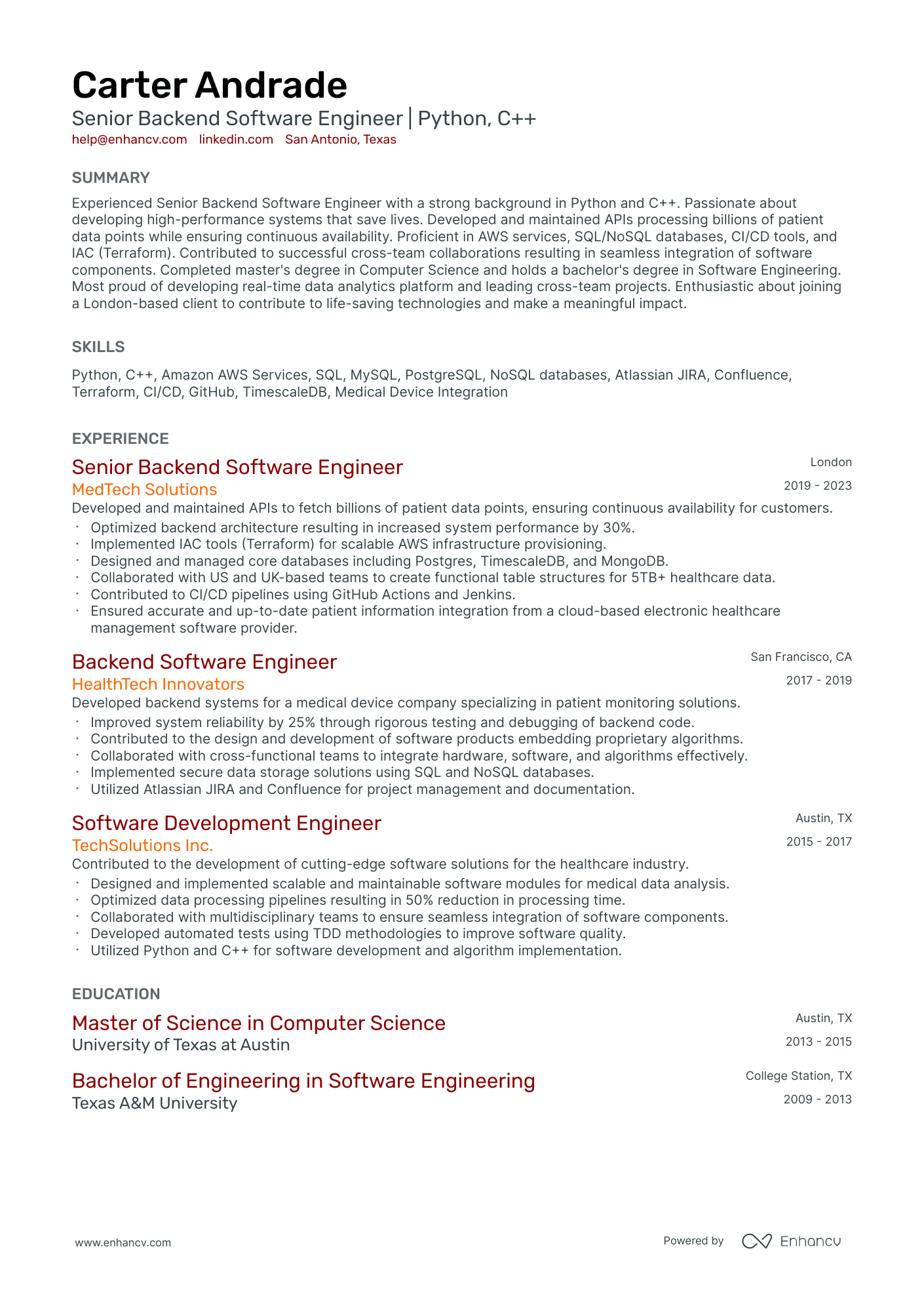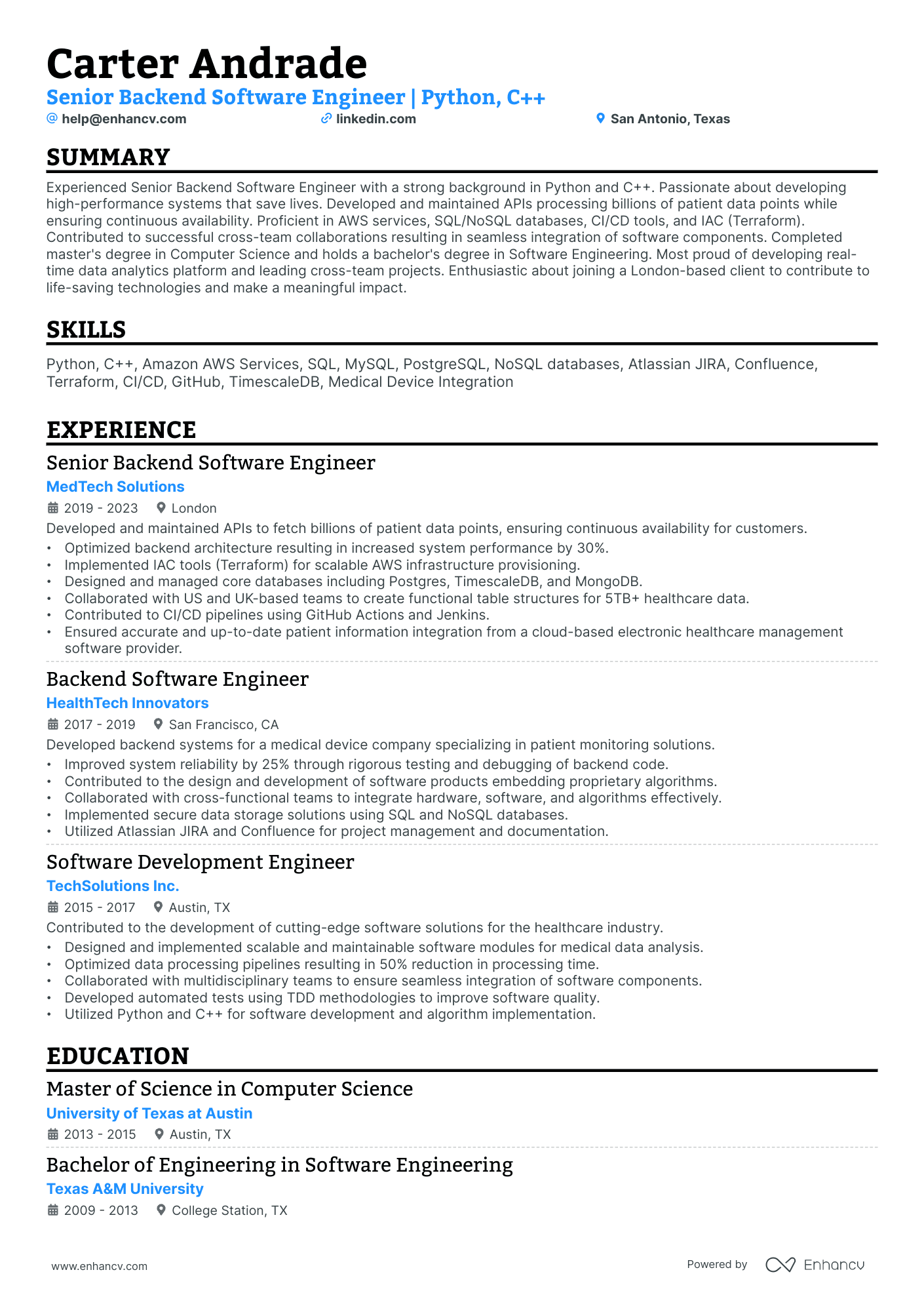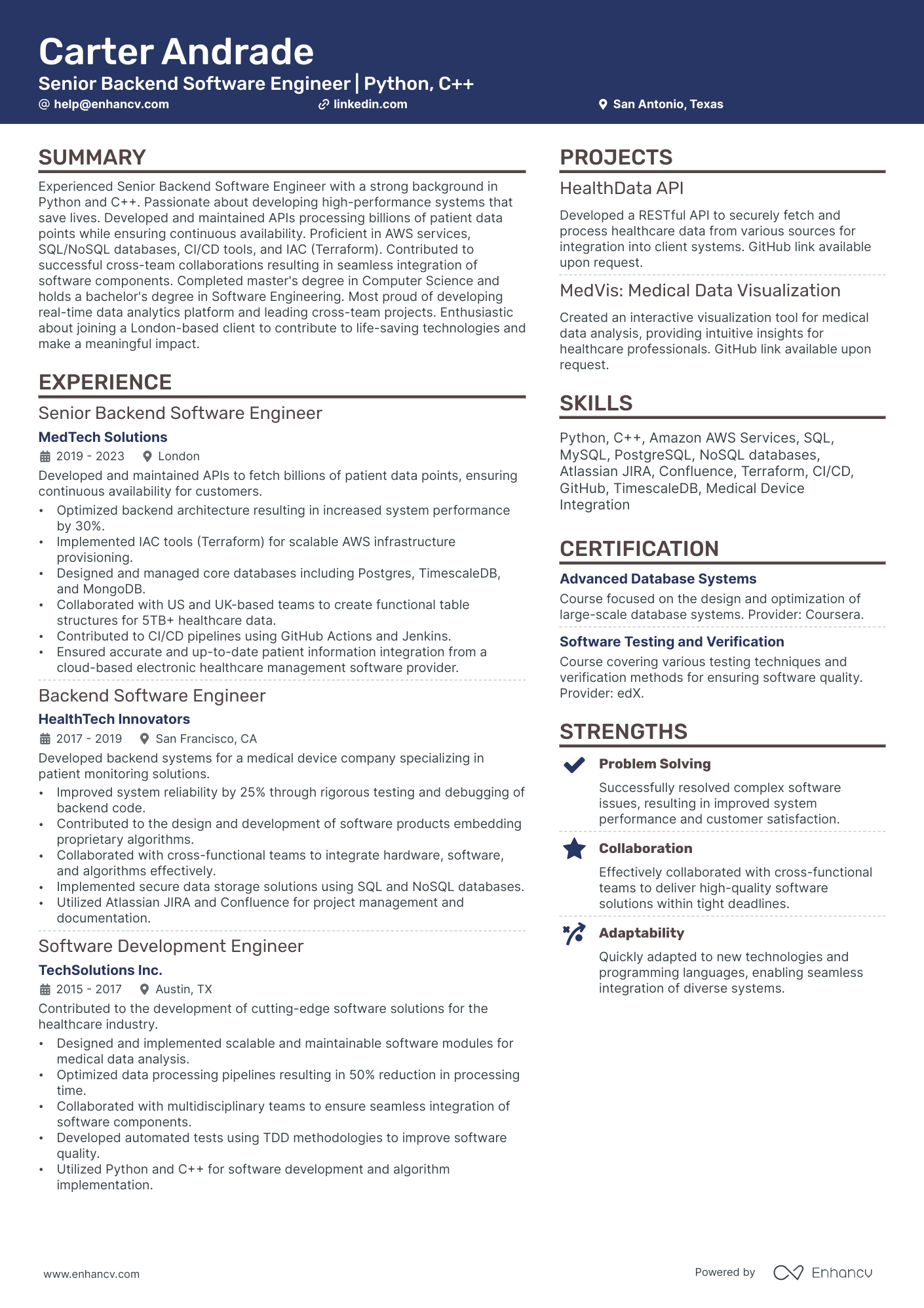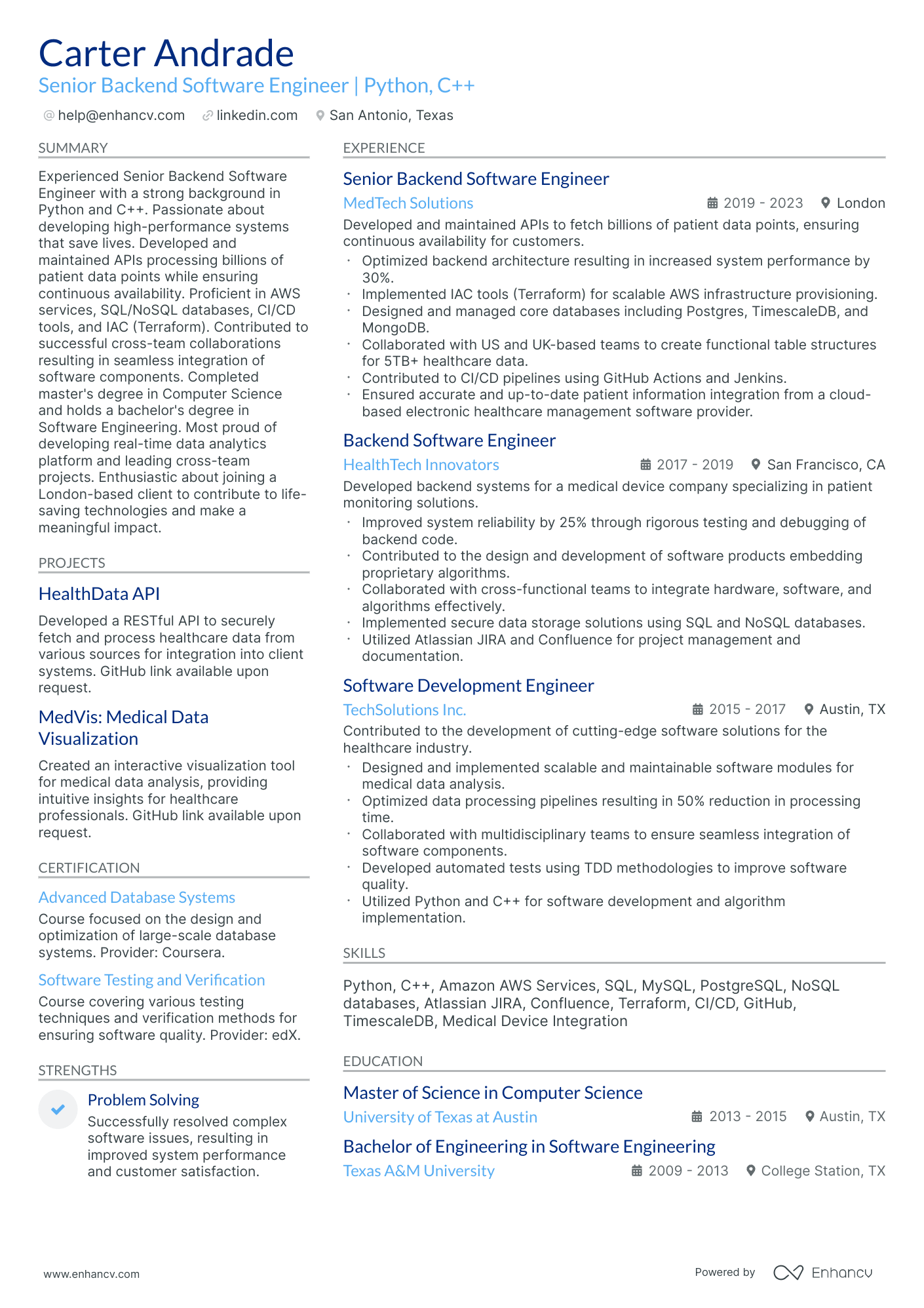Reliability engineers often struggle with effectively demonstrating their technical skills and project outcomes on their resume due to the complex nature of their work. Our guide can assist by providing targeted strategies and real-world examples to articulate these technical skills and achievements in a clear, concise, and impactful manner.
Enhance your application for the reliability engineer role with our concise guide on how to:
- Format your reliability engineer resume, ensuring a balance between professionalism and creativity, in line with best practices.
- Align your resume with the reliability engineer job requirements by incorporating relevant industry keywords.
- Utilize distinct resume sections to highlight your skills and achievements, making a case for why you're the top pick for the reliability engineer role.
- Draw from leading reliability engineer resume examples to effectively tailor your experience.
Recommended reads:
crafting an impeccable reliability engineer resume format in four steps
Your reliability engineer resume format should be both strategic and reader-friendly. Here's a concise guide to help you achieve that:
- Choose a format that aligns with the job's requirements. If your expertise is directly relevant, the reverse-chronological format is ideal. If you're focusing more on skills, consider the functional or hybrid formats.
- Header: Ensure it's populated with accurate contact details and any relevant portfolio links.
- Length: A one-page resume is standard, but if you have extensive experience, extending to two pages is acceptable.
- File type: To maintain formatting consistency, always opt for PDF.
Be aware of location-based layout differences – Canadian resumes, for instance, might differ in format.
Upload your resume
Drop your resume here or choose a file. PDF & DOCX only. Max 2MB file size.
Pro tip
Make sure your resume is ATS compliant and catches the recruiters' attention by tailoring your experience to the specific job requirements. Quantify and highlight why you're the best candidate for the role on the first page of your resume.
Must-have sections on a reliability engineer resume:
- A header to list your job title and contact information
- A resume summary or objective which highlights your top career achievements
- A detailed experience section where you emphasize the breadth of your expertise
- A skills box to put the spotlight on your social talents and technical strengths
- An education and certifications section which features your qualifications
What recruiters want to see on your resume:
- Experience with reliability testing and predictive maintenance techniques: Proficiency in using tools for condition monitoring, failure mode and effects analysis (FMEA), root cause analysis (RCA), etc.
- Understanding of reliability standards and regulations: Knowledge of ISO 55000, ASME, API, etc., relevant to the engineer's industry is often desired.
- Data Analysis Skills: Advanced use of statistical software packages like JMP, Minitab, R, or Python for analyzing reliability data can be critical.
- Certifications: Certifications like Certified reliability engineer (CRE) from American Society for Quality (ASQ) or similar can demonstrate commitment and expertise.
- Project Management Skills: Experience managing cross-functional projects, ensuring deliverables are met on time and within budget, while improving equipment reliability.
Recommended reads:
Optimizing the experience section of your reliability engineer resume
The experience section is pivotal—it bridges the gap between your qualifications and the job's requirements.
To craft an impactful reliability engineer experience section, consider these guidelines:
- Review the job posting to identify key requirements and align your past roles with these needs.
- Go beyond listing skills—demonstrate their impact through quantifiable achievements.
- Exclude roles that don't enhance your application or showcase relevant skills.
- While technical expertise is crucial, also highlight soft skills that add value to your role.
- Use action verbs to articulate your accomplishments and the skills employed to achieve them.
Below, we've provided reliability engineer resume samples to inspire your experience section, ensuring it adheres to industry best practices.
- Led a team of engineers in implementing predictive maintenance strategies resulting in a 20% reduction in equipment downtime.
- Developed and executed reliability improvement plans for critical assets, leading to a 15% increase in overall equipment effectiveness (OEE).
- Implemented condition monitoring techniques such as vibration analysis and thermography, reducing unplanned breakdowns by 25%.
- Performed failure mode and effects analysis (FMEA) to identify potential equipment failures and develop preventive maintenance procedures.
- Collaborated with the maintenance team to optimize equipment maintenance schedules, resulting in a 30% reduction in maintenance costs.
- Conducted root cause analyses for major equipment failures and implemented corrective actions, eliminating recurring issues.
- Developed and implemented reliability-centered maintenance (RCM) strategies resulting in a 20% improvement in equipment reliability.
- Led a cross-functional team in executing a capital project to upgrade critical machinery, enhancing production capacity by 15%.
- Implemented data-driven decision-making processes using statistical analysis, reducing equipment failures by 18%.
- Designed and implemented an asset management system, improving maintenance efficiency by 25%.
- Led the reliability improvement initiative for a large-scale plant expansion project, contributing to a successful on-time completion.
- Developed and delivered training programs on reliability engineering concepts and best practices to enhance the skills of maintenance personnel.
- Implemented predictive analytics models and machine learning algorithms to predict equipment failures, reducing unscheduled downtime by 30%.
- Collaborated with cross-functional teams to optimize maintenance strategies and reduce spare parts inventory costs by 20%.
- Led a reliability improvement project resulting in a 10% increase in asset performance and a 15% decrease in maintenance costs.
- Conducted reliability tests and analyzed failure data to identify design weaknesses, leading to a 15% improvement in product reliability.
- Implemented a preventive maintenance program that reduced equipment breakdowns by 20% and increased overall equipment uptime.
- Collaborated with suppliers to improve component quality, resulting in a 25% reduction in defective parts and improved product performance.
- Developed and implemented a reliability growth program, reducing the mean time between failures (MTBF) by 25%.
- Led a team in conducting reliability analyses of complex systems, identifying critical failure modes and recommending design improvements.
- Implemented condition-based maintenance strategies using IoT sensors, resulting in a 30% decrease in maintenance costs.
- Performed failure analysis investigations on field failures, identified root causes, and implemented corrective actions, reducing customer complaints by 40%.
- Developed equipment maintenance procedures and trained technicians, improving the first-time fix rate by 25%.
- Led a team in implementing a reliability-centered maintenance (RCM) program that increased equipment availability by 20%.
- Established a reliability engineering framework, integrating data analytics and risk assessment techniques to optimize maintenance strategies.
- Led a team in developing a Failure Reporting, Analysis, and Corrective Action System (FRACAS), resulting in a 30% reduction in recurring failures.
- Collaborated with cross-functional teams in the design and implementation of a new production line, achieving a 20% increase in manufacturing throughput.
- Developed and maintained reliability dashboards that provided real-time visibility into equipment performance and identified improvement opportunities.
- Led a team in developing a comprehensive spare parts management program, reducing inventory carrying costs by 25%.
- Implemented failure reporting systems and facilitated failure review boards, resulting in a 35% reduction in critical equipment failures.
The following content includes information from "O*NET OnLine" by the U.S. Department of Labor, Employment and Training Administration (USDOL/ETA). Used under the CC BY 4.0 license. The data represents the top responsibilities present on the task lists for reliability engineer professionals.
Top Responsibilities for Reliability Engineer:
- Propose logistics solutions for customers.
- Develop logistic metrics, internal analysis tools, or key performance indicators for business units.
- Conduct logistics studies or analyses, such as time studies, zero-base analyses, rate analyses, network analyses, flow-path analyses, or supply chain analyses.
- Identify cost-reduction or process-improvement logistic opportunities.
- Review contractual commitments, customer specifications, or related information to determine logistics or support requirements.
- Evaluate effectiveness of current or future logistical processes.
- Prepare logistic strategies or conceptual designs for production facilities.
- Provide logistics technology or information for effective and efficient support of product, equipment, or system manufacturing or service.
- Develop or maintain cost estimates, forecasts, or cost models.
- Analyze or interpret logistics data involving customer service, forecasting, procurement, manufacturing, inventory, transportation, or warehousing.
Quantifying impact on your resume
<ul>
No experience, no problem: writing your reliability engineer resume
You're set on the reliability engineer role of your dreams. Yet, you have little to no work experience . Here's how you can curate your resume to substitute your lack of experience:
- Don't list every single role you've had so far, but focus on the ones that align with the job you're applying for
- Include any valid experience in the field - whether it's a university research project, or a summer internship
- Highlight the soft skills you're bringing along - those that will have an added value to your application.
- Focus on your education and certifications, especially if they make sense for the role.
Pro tip
Remember, the experience section isn't just about traditional roles. It's a space to highlight all professional learning, whether from internships, contract roles, research projects, or other relevant experiences. If it's added value to your skill set for the reliability engineer role, it deserves a mention.
Decoding the essence of your reliability engineer resume: hard and soft skills
Every job description communicates the desired hard and soft skills. These skills are the backbone of your application.
Hard skills are your tangible, technical proficiencies, often validated through certifications or hands-on experience. On the other hand, soft skills reflect your interpersonal abilities and how you navigate diverse work environments.
To effectively spotlight these skills on your resume:
- Create a distinct section for technical skills, listing the most relevant ones for the job.
- Highlight your strengths by weaving in achievements that underscore specific skills.
- Strike a balance between hard and soft skills to present a well-rounded profile.
- If multilingual, include a language proficiency section, emphasizing the interpersonal advantages it brings.
Stay tuned for a deep dive into the most in-demand hard and soft skills in the industry.
Top skills for your reliability engineer resume:
Root Cause Analysis
Reliability Centered Maintenance (RCM)
Failure Mode and Effects Analysis (FMEA)
Statistical Analysis Software (SAS)
Predictive Maintenance Techniques
Reliability Engineering Tools (e.g., Weibull Analysis)
Finite Element Analysis (FEA)
Computerized Maintenance Management Systems (CMMS)
Data Analysis and Visualization (e.g., Python, R)
Risk Assessment and Management
Problem Solving
Critical Thinking
Communication Skills
Team Collaboration
Attention to Detail
Project Management
Adaptability
Time Management
Analytical Thinking
Decision Making
Next, you will find information on the top technologies for reliability engineer professonals from "O*NET OnLine" by the U.S. Department of Labor, Employment and Training Administration (USDOL/ETA). Used under the CC BY 4.0 license.
Top technologies for Reliability Engineer’s resume:
- Minitab
- SAS
- Microsoft PowerPoint
- Logistics Support Analysts SmartLogic
- Warehouse management system WMS
Pro tip
Don't go all over the place with your skills section by listing all keywords/ buzzwords you see within the ad. Curate both hard and soft skills that are specific to your professional experience and help you stand out.
Highlighting certifications and education on your reliability engineer resume
Your academic achievements, including certifications and degrees, bolster your application. They showcase your skills and commitment to the field.
To effectively present these on your resume:
- Highlight significant academic achievements or recognitions relevant to the role.
- Be selective; prioritize the most relevant and impressive certifications.
- Include essential details: certificate/degree name, institution, graduation dates, and license numbers (if applicable).
- Present your academic background in reverse chronological order, emphasizing the most recent and relevant qualifications.
For further guidance, explore popular industry certifications.
Best certifications to list on your resume
- Certified Maintenance & Reliability Professional (CMRP) - The Society for Maintenance & Reliability Professionals (SMRP)
- Certified Functional Safety Expert (CFSE) - exida
- API 510 Pressure Vessel Inspection Code: In-Service Inspection, Rating, Repair, and Alteration - American Petroleum Institute (API)
Pro tip
If you have basic certificates, place them in the skills or experience section. This saves space for high-demand industry certificates.
Recommended reads:
Adding a summary or objective to your reliability engineer resume
One of the most crucial elements of your professional presentation is your resume's top one-third.
This most often includes:
- Either a resume summary - your career highlights at a glance. Select the summary if you have plenty of relevant experience (and achievements), you'd like recruiters to remember about your application.
- Or, a resume objective - to showcase your determination for growth. The perfect choice for candidates with less experience, who are looking to grow their career in the field.
If you want to go above and beyond with your reliability engineer resume summary or resume objective, make sure to answer precisely why recruiters need to hire you.
What is the additional value you'd provide to the company or organization?
Now here are examples from real-life reliability engineer professionals, whose resumes have helped them land their dream jobs:
Resume summary and objective examples for a reliability engineer resume
Optimize your resume summary and objective for ATS
Drop your resume here or choose a file.
PDF & DOCX only. Max 2MB file size.
Additional sections to elevate your reliability engineer resume
To further differentiate your reliability engineer application, consider adding sections like:
- Publications
- Projects
- Awards
- Hobbies (only if they align with the job or showcase relevant skills).
These sections can further demonstrate your technical acumen and interpersonal skills.
Key takeaways
- The format and layout of your reliability engineer resume should reflect your career experience;
- Use the resume summary and objective to highlight your most prominent accomplishments;
- Always be specific about your experience and consider what value each bullet adds to your reliability engineer application;
- Consider how your academic background and technical capabilities could further showcase your alignment to the role;
- Your soft skills should contribute to your overall reliability engineer profile - aligning your personality with your professional self.
